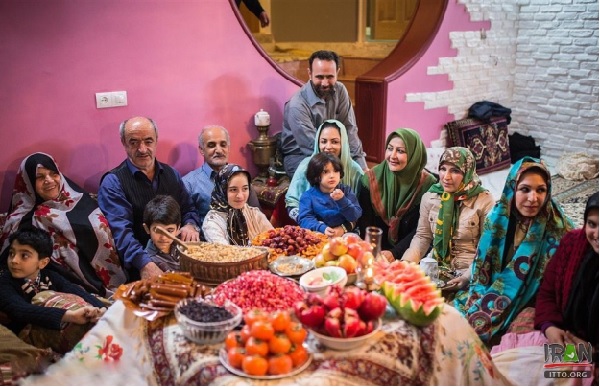
BY HASSEN IDRIS
Iranians have for three millennia stayed up on the longest, darkest and coldest night of the year, marking the occasion with beautiful long-held traditions; and now Yalda Night is officially registered by the United Nations Educational, Scientific and Cultural Organization, UNESCO, as a cultural heritage shared by Iran and Afghanistan.
According to Press TV report, the tradition is marked in Iran and across the Persian-speaking communities, including Tajikistan and Afghanistan. Capital dwellers in Tehran, jampack shopping centers to buy last minute items and prepare for the ancient celebration. The occasion is marked with a variety of long-held traditions which continue until dawn. Besides nuts and sweets, watermelon and pomegranates are also on top of the shopping list, as they’re integral to a perfect Yalda gathering.
Iranians who live far away from their homelands also uphold Yalda based on their homeland calendars, exactly as it is practiced by their own family members and indigenous individuals back home. As it is celebrated in Ethiopia by expatriate community, friends of Iranians in Ethiopia also accompanied the Event.
The author of this piece, along with his children, had the opportunity to attained the ceremony in Addis Ababa, Ethiopia. It was a colorful event which different sweets and fruits made the holiday so special.
Iran is an ancient civilization with the cradle of many breathtaking cultural events and practices. Of these, ‘Yalda’ celebration is one. ‘Yalda’ is an ancient celebration whereby people cherished the brilliance of the sun along with the warmth of life. This event coincides with an increase in day-length in the Northern Hemisphere and corresponds to the 1st Day in the Iranian calendar, which is equivalent to December 22nd. Based on Persian traditions, Yalda harbors the eventual victory of light over darkness.
After Yaldā, the days will grow longer and the nights will fall shorter. It further reshapes mindset of local communities/groups and individuals in appreciating the beauty (positive aspect: Sun, light and warmth) hidden in a seemingly unpleasant condition (negative aspect: coldness of winter and darkness). It is a long tradition celebrated in a way that serves to promote culture of peace, friendship, kindness and tolerance, fulfillment of promises and commitments.
All people from Iran joyfully celebrate this festivity. It is celebrated among all Iranian people regardless of gender, religion or ethnicity. Families get together at the houses of elders where people meet around a table called “yalda chelle Night Softre” that consists of a lamp to symbolizes light, water to represents cleanliness, red fruits (such as pomegranates, watermelons, beetroots jujube and red and green grapes) that demonstrate warmth along with dried fruits and nuts special to this occasion. All family members and neighbors sit around “yalda /Chelle Night Sofre” and served their dinner during the nightly gathering.
In Yalda tradition, women and children are at the heart of the celebration. The significant participation by women and the children alongside with their grandparents at Yalda ceremonies create safe and healthy environment between generations to learn about their sustainable future. Children perform and engage in events such as storytelling, reading books, reciting poetry and preparation of festive dishes and table that could enhance their self-esteem and internalize their learning.
Red is the Chosen Color of the Festival. Its used in Yalda celebration refer to the reddish sky after the dusk and before the dawn. Pomegranate which is native to Iran and widely cultivated in most provinces of the country, is the major fruit that has been used during the festivity. Pomegranates used to manifest a range of metaphors in Persian poetry due to its intense red color, round shape, and numerous seeds.
Every autumn, many pomegranate growers in Iran hold festivals to thank God and celebrate the harvest season. Ancient Iranians believed that the pomegranate was a sign of fertility due to its abundant seeds. The pomegranate has long been one of the essential ingredients for Persian cuisine to bring a kind of balance, taste, and flavor. Furthermore, watermelon is often served at the gathering. A bowl of special nuts is also a must on the Yaldā night. Broth, sweets, dried fruits and nuts that are used specifically for the occasion are also set on the table and consumed during the gathering.
THE ETHIOPIAN HERALD 24 DECEMBER 2022




